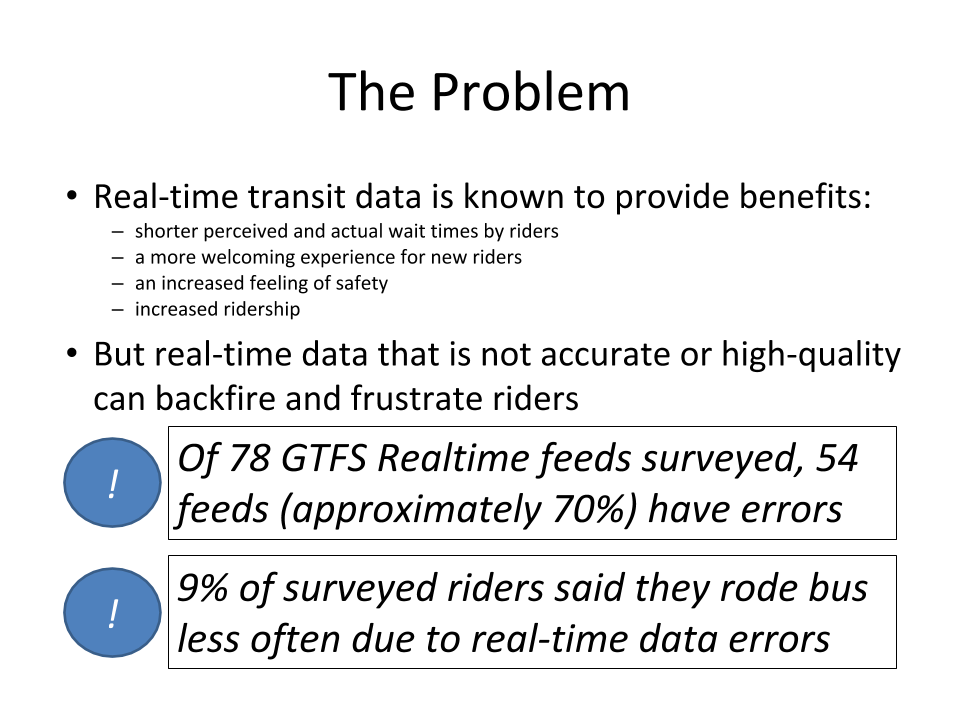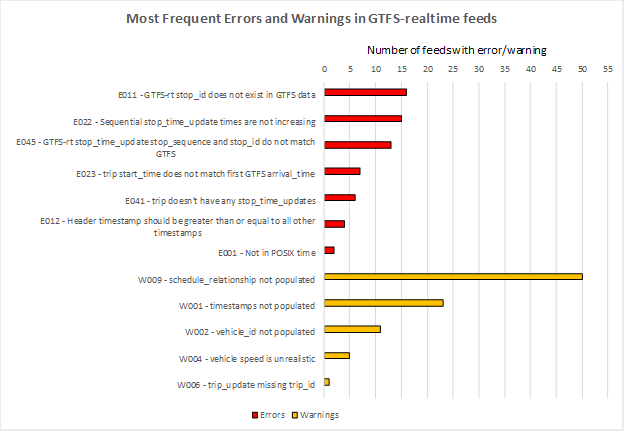We’re excited to share that the Transportation Research Board has awarded a Transit IDEA Program grant to Interline. We’re using this unique opportunity to expand Transitland to support GTFS Realtime feeds. Our goal is for Transitland to provide a suite of validation tools for public-transit agency staff to validate the contents and quality of their real-time data feeds.
High-quality real-time data is hard but worthwhile

Real-time transit information has many benefits to transit riders and agencies, including shorter perceived and actual wait times, a more welcoming experience for new riders, and an increased feeling of safety, and increased ridership. Real-time transit data is, in comparison with many other potential operational or capital improvements to bus or rail service, an affordable means of increasing ridership. In the last few years, a real-time complement to the General Transit Feed Specification (GTFS) format, GTFS Realtime, has emerged.
Despite its promise, adoption of GTFS Realtime by transit agencies has been hampered by a lack of clear documentation and readily available validation tools. Hardware and software vendors for automatic vehicle location (AVL) systems also vary in the depth and quality of their support for the GTFS Realtime specification. As a result, transit agencies must invest significant time and effort to create and maintain high quality GTFS Realtime feeds. Furthermore, bad data has been shown to have a negative effect on ridership, the rider’s opinion of the agency, and the rider’s satisfaction with multimodal trip-planning apps. Thus, transit agencies must put even more effort toward ensuring that the GTFS Realtime data produced by their systems is of sufficient quality.
Our Solution: GTFS Validation in Transitland
In this project, Interline and the Center for Urban Transportation Research are creating a prototype platform that makes GTFS Realtime validation tools readily available to, potentially, all transit agencies in North America. We will build upon two open-source projects: the GTFS Realtime validator prototype and Transitland, an open transit data platform. This project will apply the open-source and open-data community models to the challenges of creating and improving GTFS Realtime data.
By combining the open-source components of a GTFS Realtime validator with a catalog of GTFS Realtime feeds, hosted on Transitland’s cloud servers, this project will make the process of validating real-time data simple and accessible to agency staff from any computer with a web browser. As a result, GTFS Realtime data will improve in quality and availability. Transit riders will have a better experience (which has been linked to higher ridership), agency staff will provide better service with less effort and cost, and system vendors will provide higher quality product.
Our Partner: Center for Urban Transportation Research
We’re glad to have on our project team an expert on GTFS Realtime: Sean Barbeau. Sean and his colleagues at the University of South Florida’s Center for Urban Transportation Research have been involved in GTFS, GTFS Realtime, and related transit data specifications and systems for many years. Most recently, they have created a GTFS Realtime validator prototype. We’ll be working together to test and deploy this validator tooling within the Transitland platform.
For more about their preliminary findings about the quality of GTFS Realtime feeds, see this recent summary of their TRB paper. Here are the most common errors and warnings their prototype validator found in a sample of GTFS Realtime feeds:

About the Transit IDEA program
Here’s an overview of the Transit IDEA Program:
The Transit IDEA Program is part of the Transit Cooperative Research Program, a cooperative effort of the Federal Transit Administration (FTA), the Transportation Research Board (TRB), and the Transit Development Corporation (a nonprofit educational and research organization of the American Public Transportation Association). The program is funded by the FTA and is managed by TRB.
The Transit IDEA Panel has established four high-priority focus areas to encourage proposals in the following areas:Increasing transit ridershipImproving transit safety, security, and emergency preparednessImproving transit capital and operating efficienciesProtecting the environment and promoting energy independence.
IDEA stands for “Innovations Deserving Exploratory Analysis” — which we think is an apt description for the Transitland platform providing GTFS Realtime feed validation to agency staff!
An open call to transit agency staff
If your agency provides a GTFS Realtime feed, we welcome you to participate in the user-testing phase of this project. Please write us at info@interline.io for more information.





